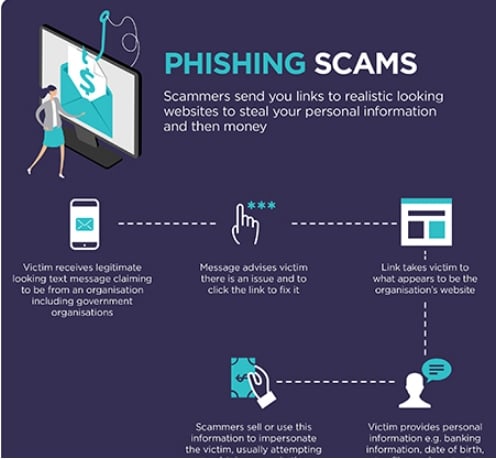 With more of us working remotely, scammers are constantly developing new tactics to access your computer and hijack critical information such as your bank account and card details. Remote access scams are one of the techniques criminals use to defraud online customers.
With more of us working remotely, scammers are constantly developing new tactics to access your computer and hijack critical information such as your bank account and card details. Remote access scams are one of the techniques criminals use to defraud online customers.
What is a remote access scam?
Scammers usually start with a telephone call or an email claiming to be from a reputable organisation that you trust, such as a bank, telecommunications company, energy provider, or government agency. The fraudster will trick you into allowing them to access your computer by downloading remote desktop software and compromising your private data.

Infographic sourced from Australian Competition and Consumer Commission Targeting scams: Report of the ACCC on scam activity 2020.
Spot the warning signs
There are several types of remote access scams, but they follow a similar pattern. These are some red flags to be aware of:
- A professional-sounding individual contacts you out of the blue, saying they need your assistance to fix your NBN connection or other computer issues
- The caller claims that you have been overcharged for a product, and they will refund your bank account
- The caller claims to have mistakenly credited your account with funds that must be repaid
- The caller requests that you download certain remote desktop software so they can access your computer to solve the problem. The caller will be persistent and may become abusive if you do not comply.
Protect yourself
- Don't provide any unsolicited callers with remote access to your computer
- Confirm who is calling and try not to get swept up with any sense of urgency they create. Take their details and call the company back directly on a number from a trusted source - not the details you are given - to check if a request is legitimate or not.
- Beware of pop-ups on your computer that say something needs to be downloaded or fixed by calling a certain number
- Do not open suspicious texts or click on links or attachments in unsolicited emails - delete them
- Keep your computer security software up to date
- Purchase items only on reputable sites that you trust
- Turn on two-factor authentication for extra security
- Don't share your login details, PINs or passcodes with anyone. Be cautious of any unprompted calls or messages from someone claiming to be from your bank or a fraud team that ask for these details.
By taking reasonable precautions, you can help protect yourself from falling victim to remote access scams. If you are targeted, you can report the incident to Scamwatch and should contact your bank as soon as possible if you think your accounts have been compromised by scam activity.
This article is intended to provide general information of an educational nature only. Terms, conditions, fees, charges and credit criteria apply. Information in this article is current as at the date of publication.




